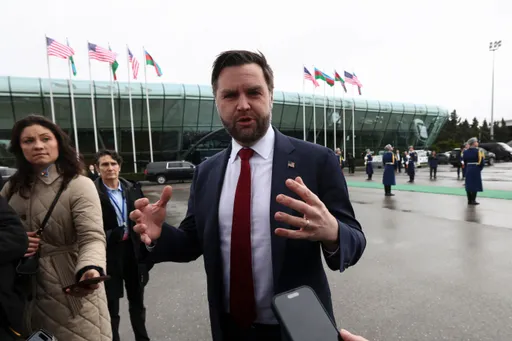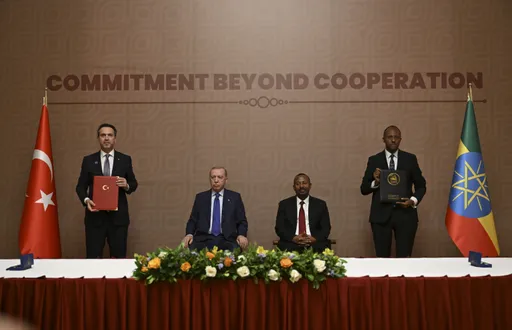Two of the strongest leaders in the Gulf are Abu Dhabi's Crown Prince Mohammed bin Zayed al Nahyan (MBZ) and Saudi Arabia’s Crown Prince Mohammed bin Salman (MBS). While the older, more experienced MBZ enjoys the fruits of power, posing for photo ops as he promotes girls’ education, the Saudi prince grapples with an international crisis following the murder of journalist Jamal Khashoggi in the Saudi consulate in Istanbul.
The media often draws parallels between MBZ and MBS, at times pointing out that the Emirati holds a great deal of influence over the Saudi crown prince — almost as an older brother or mentor.
MBZ has “a special relationship with Mohammed bin Salman,” Gulf State Analytics CEO Giorgio Cafiero told TRT World.
“In recent years, as both MBZ and MBS have consolidated much power in their hands in Abu Dhabi and Riyadh, respectively. Both Saudi and Emirati foreign policy have become increasingly about these two leaders,” he said.
Political analyst Abdelrahmane Amor told TRT World that the two “have an understanding of how they want to shape the Middle East and their relationship with the United States and Israel”.
But their approach is not always sympatico.
The war in Yemen
The war between the Houthi rebels and the Yemeni government has killed more than 40,000 people from both sides and has devastated the country.
The main forces backing the so-called internationally-recognised Yemeni government are often referred to as the Saudi-led coalition, but the UAE is also a key player. Kuwait, Egypt, Morocco, Jordan, Sudan and Senegal also play a part while the US has supplied the coalition with weapons and intelligence.
But while the Saudis’ overarching aim has been to rid the country of Iran-backed Houthis (both MBS and MBZ see Iran as a major threat), the UAE has pressed more urgently to expand its geopolitical presence.
“There are some sources of tension in bilateral ties underscored by the UAE's support for certain actors in southern Yemen,” Cafiero said.
An uprising by UAE-backed southern Yemeni separatists against forces loyal to the government of President Abd Rabbu Mansor Hadi could further complicate efforts to dislodge the Houthis from Yemen’s capital Sanaa.
After Sanaa fell to the Houthis, the southern port city of Aden became the de facto capital of Yemen, controlled by President Abd Rabbu Hadi’s government, and is where the Gulf coalition also has a base.
The UAE entered the Yemeni war with an interest in Aden’s port, which could give them access to the Indian Ocean and perhaps the Strait of Hormuz island which is shared with the other Gulf states and Iran.
But the UAE is seen as wanting more. In May, the UAE planted troops on the southeastern island of Socotra, which was much objected to by the Yemeni government and prompted Saudis to send in their military as a counter-check to their coalition partner.
Socotra would give MBZ more access to the strategic trade route via the Bab el Mandab Strait — the UAE already has a presence in Eritrea and also has eyes on Djibouti.
The joint attempt to drive the Houthis out has often left the Saudis grappling with accusations of war crimes. The war has since devolved into a humanitarian crisis with the UN saying around 400,000 malnourished children could die of food shortages.
All eyes on MBS
On June 5 2017, Saudi Arabia, Bahrain, Egypt, the UAE, and the Yemeni government cut ties with Qatar, accusing it of supporting terrorism.
Doha denied that charge and says the boycott is an attempt to impinge on its sovereignty.
Many of the events that triggered the Gulf blockade against Qatar ultimately pointed to the UAE’s involvement in setting up Doha to take a fall.
But when efforts are made by the US for a rapprochement between the neighbouring states, it is focused towards the Saudi Kingdom, not the UAE.
And the Khashoggi murder only served to complicate things for MBS who came under more public scrutiny than ever. The brutal and brazen killing of the Saudi journalist at his own consulate in Istanbul forced the allies of MBS in the Trump administration to take a sterner tone with the crown prince.
Whether MBS will soften his stance towards Doha is still to be seen but he was heard publicly praising Qatar at the “Davos of the East” which followed soon after Khashoggi’s death. However, it is unlikely MBZ would follow.
“Suggestions that the [Saudi] Kingdom may ease its blockade on Qatar would likely upset the leadership in Abu Dhabi,” Cafiero told TRT World.
Co-existence or threat?
When the battle for the Saudi throne was being played out between MBS and then heir apparent Mohammed bin Nayef, MBS got the stamp of approval from the Trump administration as his relationship with Trump's son-in-law and senior advisor Jared Kushner had blossomed after the 2016 US presidential election.
Nonetheless, the nod from the US did not come without MBZ, who also lobbied for his protege in Washington.
“MBZ has great experience in leading Abu Dhabi and being the de facto leader of the UAE and he is a mentor to MBS who is attempting to go through the ranks alongside an American blessing,” explained Amor.
Yet, be it Yemen, extremist groups and clerics, or the Qatar blockade, one thing seems apparent, MBS seems to be the focus while MBZ watches from a distance.
“There is a lot more scrutiny of imprisonment and abusive human rights when it does occur in Saudi Arabia and that’s because of the juxtaposition of those atrocities and the MBS’ vision for 2030 and this evolution of the Saudi State into a more progressive environment,” Amor said.
MBZ is also the more experienced crown prince, well-versed in politics and economic development. His manoeuvring skills can be seen in his negotiation of a massive trade and defence deal with Saudi Arabia, isloating the Gulf Cooperation Council.
His deep reach into Washington is not limited to catapulting people to success, he is also thought to have brought down former secretary of state Rex Tillerson when he did not support the Gulf blockade against Qatar.
MBZ and MBS are “battling each other,” and the possibility remains that the “one cannot exist if the other exists,” Amor told TRT World.























